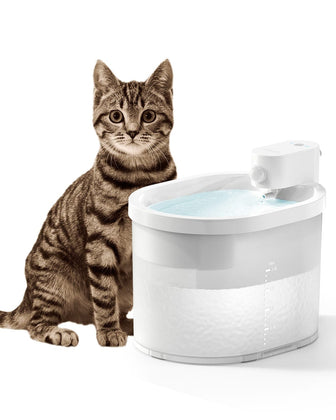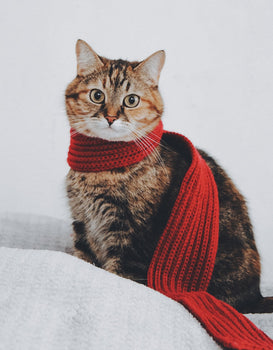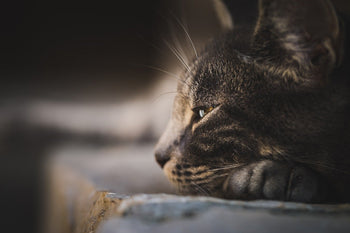Cats are fascinating creatures with unique personalities that make them a popular choice for pets. One of the most important aspects of caring for a cat is understanding their urinary habits. Knowing how often a cat should pee is crucial to monitoring their health and detecting any potential issues.
Normal Urination Frequency for Cats can vary depending on several factors, including age, diet, and environmental temperature. Generally, healthy adult cats urinate between two to four times a day. However, some cats may urinate more or less frequently, which could still be considered normal. It's important to note that kittens and senior cats may have different urination habits compared to adult cats.
Factors Affecting Urination Frequency can include the amount of water a cat drinks, their diet, and underlying health conditions. For example, cats that eat wet food may urinate more frequently than cats that eat dry food. Additionally, cats with urinary tract infections or kidney disease may have increased or decreased urination frequency.
Monitoring your cat's urination habits is essential to detecting any changes that could indicate a health problem.
How Often Do Cats Pee: Understanding Feline Urination Patterns
Key Takeaways
Healthy adult cats typically urinate between two to four times a day.
Several factors can affect a cat's urination frequency, including age, diet, and underlying health conditions.
Monitoring your cat's urination habits is crucial for detecting any changes that could indicate a health problem.
Normal Urination Frequency for Cats
Typical Range and Influencing Factors
A healthy adult cat will typically urinate between 2 to 4 times a day. However, this is just a general guideline, and a cat's urinary habits may differ from what is considered "normal." There are various factors that can affect a cat's urinary habits. For instance, if a cat is on a wet food diet, they may need to pee more often as compared to a cat on a dry food diet. Similarly, a cat's age, gender, and overall health can also influence their urinary habits.
Examples of Varied Urination Frequencies
Some normal healthy cats may urinate just once or twice a day, while others may urinate five or six times. It is essential for cat owners to keep an eye on their cat's urinary habits and become familiar with what is normal for their cat. Any sudden changes in urination frequency, such as a decrease in the number of times a cat pees or an increase in the frequency of urination, may indicate an underlying health issue that requires veterinary attention.
In conclusion, while there is a typical range for a cat's urination frequency, it is important to keep in mind that every cat is unique, and their urinary habits may vary based on several factors. By monitoring a cat's urinary habits and seeking veterinary attention if there are any sudden changes, cat owners can ensure their cat's overall health and well-being.
Factors Affecting Urination Frequency
Cats are known for their fastidious grooming habits, but they are also creatures of habit when it comes to their urinary habits. Understanding the factors that affect a cat's urination frequency can help owners identify potential health problems and provide appropriate care.
Age-Related Urination Patterns
Age is a significant factor that can impact a cat's urinary habits. Kittens tend to urinate more frequently than adult cats, with some kittens urinating as often as every 30 minutes. As cats age, their urinary habits may change due to a variety of factors, including changes in muscle tone, hormonal changes, and underlying health conditions. Older cats may have a reduced urination frequency due to decreased kidney function or other age-related health issues.
Diet and Urine Output
A cat's diet can also affect its urination frequency. Cats that eat wet food may urinate more frequently than cats that eat dry food due to the higher moisture content in wet food. Additionally, the type of food a cat eats can impact the pH level of its urine, which can affect urinary tract health.
Hydration and Urinary Habits
Proper hydration is essential for maintaining a cat's urinary health. Cats that do not drink enough water may be at risk for urinary tract infections, bladder stones, and other health problems. Providing fresh, clean water at all times and encouraging cats to drink water can help maintain proper hydration levels and support healthy urinary habits.

Medical Conditions and Medications
Several medical conditions can affect a cat's urination frequency, including urinary tract infections, bladder stones, and kidney disease. Certain medications can also impact a cat's urinary habits, such as diuretics and medications that affect bladder function. If a cat's urination frequency changes suddenly or significantly, it is essential to consult a veterinarian to rule out underlying health issues.
Related Posts:
Monitoring Your Cat's Urination Habits
Cats are known for being independent creatures, but it's important to keep an eye on their urination habits. By monitoring their urination habits, you can identify potential health problems early and get your cat the veterinary care they need. This section will cover the different ways to monitor your cat's urination habits.
Tracking Urination Habits
One of the easiest ways to monitor your cat's urination habits is to keep track of how often they use the litter box. A healthy adult cat should pee between two to four times a day. However, keep in mind that this is just a general guideline, and your cat's urinary habits may differ from what is considered "normal". There are various factors that can affect a cat's urinary habits. For instance, if your cat is on a wet food diet, they may need to pee more often than a cat on a dry food diet.
Observing the Litter Box
Another way to monitor your cat's urination habits is to observe the litter box. If you notice that your cat is peeing outside of the litter box, it could be a sign of a urinary tract infection or other health issues. You should also pay attention to the amount of urine and the color and consistency of the urine. If you notice any changes in your cat's urine, it's important to seek veterinary attention.
Changes in Urination
Changes in your cat's urination habits can be a sign of an underlying health issue. For example, if your cat is drinking more water than usual, it could be a sign of kidney disease or diabetes [^1]. If you notice any changes in your cat's urination habits, it's important to seek veterinary attention immediately.
Seeking Veterinary Attention
If you notice any changes in your cat's urination habits, it's important to seek veterinary attention immediately. Your veterinarian can perform a physical examination and run diagnostic tests to determine the underlying cause of the changes in your cat's urination habits. Early detection and treatment of health issues can help improve your cat's overall health and well-being.
Related Posts:
Conclusion
Cats are fascinating creatures, and their urinary habits are no exception. The frequency of a cat's urination can vary depending on several factors, including age, diet, and overall health.
A healthy cat should urinate between two to four times per day. However, this is just a general guideline, and some cats may urinate more or less frequently. It is essential to monitor a cat's urinary habits regularly and be aware of any changes that may indicate a potential health issue.
A cat's diet can also affect their urinary habits. Cats that consume wet food may need to urinate more frequently than those that eat dry food. Additionally, the quantity, color, and smell of a cat's urine can provide valuable information about their overall health.
In conclusion, understanding a cat's urinary habits is crucial for their overall health and well-being. By monitoring their urinary habits and being aware of any changes, cat owners can help ensure that their feline companions remain healthy and happy.

Frequently Asked Questions
What is the typical frequency of urination for a cat in a 24-hour period?
A healthy cat should urinate 2-4 times within a 24-hour period. However, the frequency may vary depending on factors such as age, water consumption, diet, heat, and humidity. Some normal healthy cats may urinate just once or twice a day, while others may go more often.
What factors influence the urination patterns of male versus female cats?
Male cats tend to urinate more frequently than female cats. This is because male cats have a narrower urethra, which can become obstructed more easily. Additionally, male cats are more prone to urinary tract infections and other urinary tract issues.
Can a cat's urination frequency change at night?
Yes, a cat's urination frequency can change at night. Some cats may urinate more frequently at night due to a variety of factors, including changes in their sleep patterns, changes in their diet or water intake, or underlying medical conditions.
What are the signs of abnormal urination frequency in cats?
Signs of abnormal urination frequency in cats include urinating outside the litter box, straining to urinate, urinating small amounts frequently, or not urinating at all. These signs may indicate an underlying medical condition, such as a urinary tract infection, bladder stones, or kidney disease.
How long is it safe for a cat to go without urinating?
It is not safe for a cat to go without urinating for more than 24 hours. If a cat has not urinated for this length of time, it may be experiencing a urinary obstruction, which is a medical emergency.
What does the size of a cat's urine clump indicate about its health?
The size of a cat's urine clump can indicate its hydration status. If a cat is well-hydrated, its urine clumps will be larger and more solid. If a cat is dehydrated, its urine clumps will be smaller and less solid. Additionally, the color and odor of a cat's urine can also provide important information about its health.
















